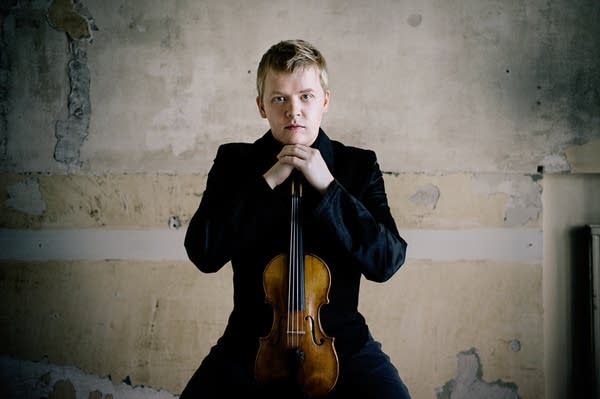St. Paul-based cellist Kirsten Whitson lives a busy musical life as a teacher, orchestral player and chamber musician.
With the three June performances of her solo cello project Bearing Witness, she will also serve as concert presenter and storyteller.
The program for Bearing Witness began musically, but soon evolved into something broader, containing explicit reflections on the real world.
"I collected a group of pieces I thought would work well together musically," Whitson says. "As I studied and lived with this music, I was stunned to realize the pieces were all connected by themes of genocide, global racial injustice and cultural loss."
Her creative vision became something bigger than just a traditional cello recital. With help from the Minnesota State Arts Board, she fleshed out the performance's unusual concept.
"I needed to find a way to provide historical context without having listeners reading extensive program notes, so I decided to have video narration between pieces," she says.
That video narration, scripted by Whitson and performed by teenagers, will explore the stories behind the music.
Those stories are often dark and always moving. The concert's opener, Timothy Takach's Thirty-Eight Tears, pays tribute to the 38 Dakota men killed in Mankato in 1862 on the orders of the U.S. government.
"While the Dakota men were incarcerated at Fort Snelling and later taken to Mankato to be hanged, they sang traditional Dakota songs and a Christian hymn," Whitson explains. "I tracked down the hymn, and Tim based the piece on it."
The program's second piece is Khse Buon, by Chinary Ung.
"The score is unlike anything I've ever seen," Whitson says. "The notation looks unusual and beautiful, and it's not something I could just sit down and play through. It had to be studied away from the cello, and I actually learned it in the car on the way home from the Grand Teton Music Festival."
The work of Ung is a link to vitally important history of Cambodian genocide. Whitson explains that much of Ung's family died during the Khmer Rouge regime: He "spent years helping refugees, while trying to preserve the traditional Cambodian arts and music the regime was determined to destroy."
Composer Mieczyslaw Weinberg was born in Warsaw and lived from 1919 to 1996. Most of his family died in the Holocaust, but he survived by escaping to the Soviet Union (where he befriended Shostakovich). Weinberg's large output — often colored by his early wartime losses — includes several sonatas for solo cello, one of which will appear on Whitson's program.
Weinberg's story complements one of the narrator's scripted stories, which discusses another young Polish boy who became a prisoner of war during the German invasion.
"They probably didn't know each other, but their stories overlap," Whitson says.
Composer John Williams is best known for his movie scores, but he has also written works for the concert hall. Those twin expertises converge in Three Pieces for Solo Cello — Rosewood, Pickin' and The Long Way North. Three Pieces arose from Williams' score to the 1997 film Rosewood, about the racially motivated destruction of Rosewood, Fla., which occurred in 1923 and began after a white woman falsely accused a black man of assault.
"It was written for Yo Yo Ma," Whitson says, "but the score was never published. The week I found out this music existed, John Williams was working with the Los Angeles Philharmonic, where one of my sisters plays violin. I begged her to ask him for his piece, and it arrived in the mail days later."
The performance ends with Having Wept, by Giya Kancheli. Whitson calls her discovery of the work "a happy accident": After playing Kancheli's Night Prayers with the Saint Paul Chamber Orchestra, she Googled his work and discovered this piece.
"Having Wept is haunting and meditative and a beautiful way to end this program," she says.
Whitson is bringing Bearing Witness to three diverse venues across the Twin Cities. (Admission is free, but donations are appreciated.) The first performance is at 7:30 p.m. June 4 at the East Side Freedom Library in the Payne-Phalen neighborhood of St. Paul. The second is planned at 4 p.m. June 9 at St. Paul's SpringBOX, a former car dealership with, according to Whitson, "surprisingly good" acoustics and an enthusiastic audience. The final performance will be at 7:30 p.m. June 10 at Gethsemane Episcopal Church in Minneapolis.
Bearing Witness is an ambitious project, and it doesn't shy away from addressing political history that many classical musicians might prefer to brush over, or even brush under the rug entirely.
Whitson disagrees with that approach.
"I think musicians have an opportunity to be a catalyst in raising consciousness about societal problems," she says. "Music has tremendous power and can touch people deeply. These days, especially, words seem to be so polarizing. Between the stories and the music, I hope this program will elicit empathic imagination for people."
Love the music?
Show your support by making a gift to YourClassical.
Each day, we’re here for you with thoughtful streams that set the tone for your day – not to mention the stories and programs that inspire you to new discovery and help you explore the music you love.
YourClassical is available for free, because we are listener-supported public media. Take a moment to make your gift today.










